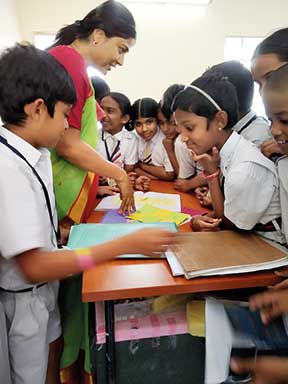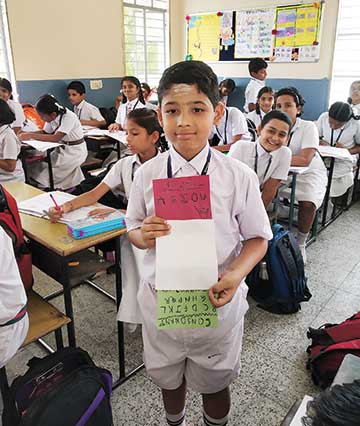Sonali Ghosh
“A teacher who establishes rapport with the taught, becomes one with them, learns more from them than he teaches them. He who learns nothing from his disciples is, in my opinion, worthless. Whenever I talk with someone, I learn from him. I take more than I give him. In this way, a true teacher regards himself as a student of his students.” – Mahatma Gandhi
Sir Paul McCartney and George Harrison were students in the Liverpool Institute High School for Boys in the mid 1960s. Neither of them enjoyed the music classes nor did their music teacher see any musical talent in them. We had half the Beatles in one class and the music teacher had no clue. As a teacher in primary classes, I reflect upon this often and a frightening feeling overcomes me. I ask myself if I am in the same league as that music teacher. The answer I seek to this question of missing out as a teacher, I propose to explore in this article.
 A teacher has to confront several paradoxes in her classroom: packed classes, rigid framework of the school syllabus, the number of sessions each day, mostly parents oriented towards high scores than learning, the humongous task of record-keeping, our conception of discipline and so on. Such an ecosystem encourages monologue, where the teacher mostly speaks driven by senseless compliance and rigid discipline. Even the most inspired teacher can find herself in an unenviable situation only to lament that ‘the hundred songs a child is born with’ is reduced to a single song sooner than later.
A teacher has to confront several paradoxes in her classroom: packed classes, rigid framework of the school syllabus, the number of sessions each day, mostly parents oriented towards high scores than learning, the humongous task of record-keeping, our conception of discipline and so on. Such an ecosystem encourages monologue, where the teacher mostly speaks driven by senseless compliance and rigid discipline. Even the most inspired teacher can find herself in an unenviable situation only to lament that ‘the hundred songs a child is born with’ is reduced to a single song sooner than later.
A sleep-deprived child and a disciplinarian teacher
Years ago something happened in my classroom. It convinced me that despite the paradoxes and compulsions narrated above, I could appreciate the importance of listening to the unspoken words of children. Sambhav (class V), considered a diligent and attentive student, was fast becoming a laggard in all respects. Mostly he would doze off during class. As his class teacher, the other teachers would complain to me. Meeting with his parents and counselling him yielded no improvement. The situation worsened, till his friend Prateek told me that Sambhav lived in a small flat and his grandpa was seriously ill. He needed attention throughout the night. The family could hardly get any sleep. The dignified boy that he was, Sambhav was silently coping with the trauma in the best manner he could. Upon learning this, we took a series of steps, some truly unconventional: allowing him to skip the assembly. The yoga teacher initiated him into the subtle art of yoga-nidra (30 minutes of yoga-nidra practice can be equivalent to four hours of sleep). The incident made me introspect. Why did Sambhav not confide in me or the other teachers? Perhaps he did not have the confidence, and unfortunately rightly so, that we would listen to him without being judgmental. Sambahv and Prateek’s conduct, in a subtle sense, was what Jiddu Krishnamurti would term as the ‘flowering of goodness’. This experience was transformational for the entire teaching community in the school.
We, the children, shall teach grammar
Another anecdote which left a lasting impression on me. Each child can become a teacher and a guide to other children. She can understand the need of her fellow mates as well and at times better than us. A teacher can be intimidating to the children but generally not another child/classmate.
 In grade IV a few children were unable to understand the use of articles ‘a’ and ‘an’. I explained to them the basic concepts repeatedly and warned them of dire consequences if they were unable to answer in the next class. The following day, I found no improvement. It was disappointing to me. Amidst my anxiety and disgust, two students intervened. They informed me that they had improvised a simple activity the previous night and requested me to teach the concept of articles using their activity. I prompted the two students to teach in the class. To my sweet surprise, all the students responded well, they understood the concept of articles and applauded that simple method of teaching. The quality of classroom interaction changed the moment I allowed the two students, who were empathetic to their fellow students, to teach. This incident makes it abundantly clear that learning outcomes can be substantially improved if the teacher can create a situation where each student is simultaneously a student and a teacher. Sometimes students respond well to each other’s needs better than a teacher. I, as a teacher got a strong message of undaunting patience and empathy towards learners.
In grade IV a few children were unable to understand the use of articles ‘a’ and ‘an’. I explained to them the basic concepts repeatedly and warned them of dire consequences if they were unable to answer in the next class. The following day, I found no improvement. It was disappointing to me. Amidst my anxiety and disgust, two students intervened. They informed me that they had improvised a simple activity the previous night and requested me to teach the concept of articles using their activity. I prompted the two students to teach in the class. To my sweet surprise, all the students responded well, they understood the concept of articles and applauded that simple method of teaching. The quality of classroom interaction changed the moment I allowed the two students, who were empathetic to their fellow students, to teach. This incident makes it abundantly clear that learning outcomes can be substantially improved if the teacher can create a situation where each student is simultaneously a student and a teacher. Sometimes students respond well to each other’s needs better than a teacher. I, as a teacher got a strong message of undaunting patience and empathy towards learners.
Leadership is about empathy and collaboration. The outcomes of both the anecdotes were reassuring to me as a teacher. My students were getting practical insights into how leadership works. Most human problems in personal lives, society and national/international levels have their roots in the absence of dialogue. Dialogue is possible if we listen.
The natural orientation of a teacher is to teach to meet deadlines. She operates from her experiences and her ego that she knows the best. She believes foolishly that students will learn if she teaches them in a certain way. To promote and encourage listening skills among the teachers is a challenge. Unlike other forms of communication (like reading, writing and speaking), listening is a character skill, which is not taught in schools. The good news is that listening can be improved through mindfulness training. Listening experts like Julian Treasure advocate that the art of listening must be imparted in schools. This can unleash a new way of understanding and bonding between the students and teachers. Charity begins at home; mindful listening must first be practiced by the teachers. As teachers, “we must seek first to understand and then to be understood.”
The author is a teacher at Brahm Prakash DAV School, Midhani Township, Kanchanbagh, Hyderabad. She can be reached at sonalighosh31@gmail.com.
